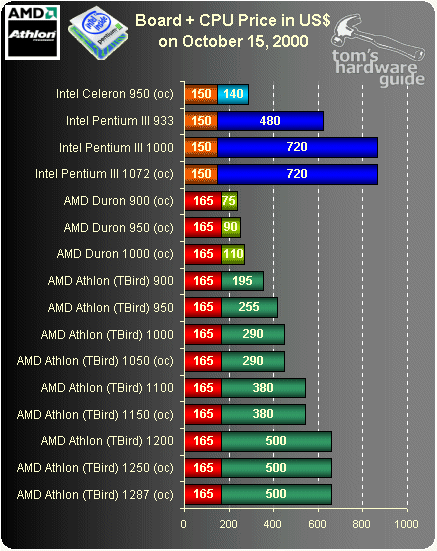AMD Extends Performance Lead With New Athlon and Duron Processor
Benchmarking Considerations
I guess the expectations are rather clear. The new Athlon 1200 will obviously rule all benchmarks just as its 7-weeks older brother Athlon 1100 has exercised it before. No new competitor from Intel has joined the battle yet, so that AMD's performance bastion remains even safer than before.
I refrained from benchmarking Duron 800 at its defined clock frequency, because I have published numbers of Duron 800 already a few months ago and they obviously haven't changed since. Please have a look at "The Celeron Killer -AMD's New Duron Processor " and "Overclocking AMD's Thunderbird and Duron Processor " for more details. I still did benchmark the Duron 800 sample, but only at 1000 MHz. The Duron 800 seems to be the first Duron processor that is able to reach 1 GHz reliably and that is what makes it particularly interesting. I also overclocked Athlon 1200. You might know from AMD's data sheets, that no current Athlon and Duron processors can be adjusted to a higher clock divider (multiplier) than x12.5. Therefore I was limited to 1250 MHz as long as I stuck to the official 100 MHz bus clock of Athlon. To reach more I had to increase the bus clock and the overclocked Athlon 1200 was 'only' able to finish the touchy Linux kernel compilation successfully at up to 1287 MHz (103 MHz x 12.5).
If you look at the results of Duron 1000 and Athlon 1287 you might notice something very interesting. The benchmark score in the majority of the tests doesn't increase anymore as much as expected. This is particularly obvious in case of Duron at 1 GHz. There's only one explanation for this behavior. A clock multiplier of x9.5 seems to be the sweet spot of Duron and its 64 kB second level cache. Increasing Duron's clock frequency to 10 times the bus clock or more makes the clock difference between bus and processor core too big for Duron's small L2-cache to buffer the supply with code and data from main memory. Basically Duron is simply not getting any faster anymore, because the core is starving for code and data at a core-to-bus-clock ratio of beyond 9.5. The same seems to be valid for Athlon at a multiplier of beyond 12.5, which might be the reason why AMD didn't incorporate any higher multiplier into Athlon's core.
This brings us to the simple conclusion that AMD will need to increase the bus clock in order to get more than 950 MHz out of Duron and more than 1250 MHz out of Athlon. The next Athlon processor will probably be an Athlon 1330, running at 133 MHz bus clock x 10. This could also mean that you will require new platforms for the next batch of Athlons, since I doubt that the current ones are able to support 133 MHz EV6-bus.
Of course that's wild speculation on my part, but it sounds pretty reasonable. It also reminds me of the fact that Intel will supply the next generation Pentium III core by the name of 'Tualatin' with 512 kB L2-cache. 'Tualatin' is supposed to run at 1.13 GHz and beyond, with a bus clock of 133 MHz.
Price - Performance
If you've read my article about Athlon 1100 you may remember that I introduced price-performance charts to make it a bit easier for you to see what you are actually getting for the money spent on your processor. I received a lot of response to this new system and many people suggested that I should also add the motherboard price to the price of each processor. I took this to heart so that this time the price-performance charts will be based on the prices of both, the processor plus the required motherboard.
Here's the pricing I was able to find for all the processors and motherboards:
Get Tom's Hardware's best news and in-depth reviews, straight to your inbox.
